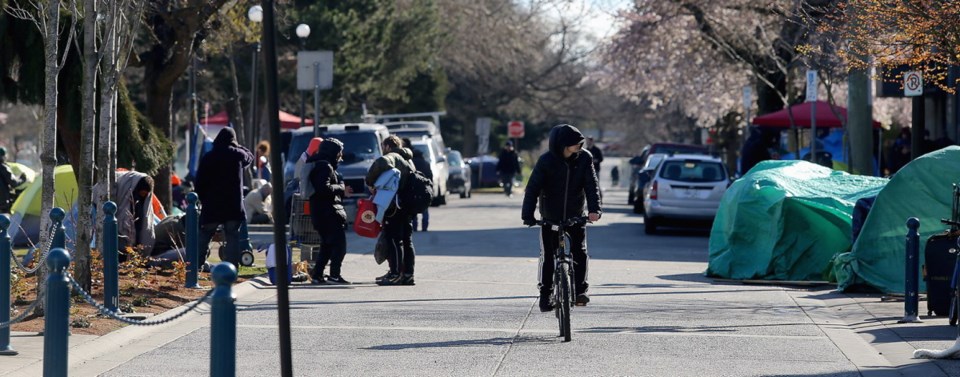The City of Victoria will allow people without homes to set up temporary shelters at Beacon Hill and Topaz parks in a move aimed at curbing the spread of COVID-19, Mayor Lisa Helps confirmed on Monday.
As well, B.C. Housing is working with Island Health to use city-owned Royal Athletic Park as a staffed outdoor shelter for people with more acute mental-health and addictions challenges.
Helps said the measures are part of a short-term strategy to deal with a situation in the 900-block of Pandora Avenue where vulnerable people are “crammed” together and unable to meet the social-distancing directives issued by provincial health officer Dr. Bonnie Henry.
The long-term plan is to move people indoors as soon as possible, she said.
“The province has declared a state of emergency, which means that they can take over any of the city’s facilities to shelter people,” Helps said. “So as we speak, I think the province is going through an assessment of which city facilities would be best to move people inside.
“And that’s the idea, to have people temporarily move into parks to disperse them from the 900-block of Pandora. There are way too many people on the 900 block of Pandora. It’s not safe in terms of social distancing.”
Helps said B.C. Housing has already purchased a building for temporary use as a triage and testing site for people who are homeless. In addition, Island Health is looking at setting up self-isolation beds for vulnerable people who test positive for COVID-19, she said.
The shelters at Beacon Hill and Topaz parks will be established immediately and will provide access to meals, handwashing stations, washrooms and up-to-date health information, Helps said.
Controls will be in place to make sure people maintain safe distances, she said.
“There’ll be health professionals on site, service provision on site.”
Royal Athletic Park will be used for people with more acute needs, and Helps praised the “tremendous leadership” of Jim Swanson, one of the owners of the Victoria HarbourCats baseball club, for supporting the plan and placing a priority on helping the city’s most vulnerable citizens.
“I think we’ve all got to step up right now,” Swanson said in an interview.
“And, frankly, whatever is best to help alleviate what looks like a severe health issue in the midst of this global pandemic.
“Obviously, Pandora doesn’t look very good right now and I think it’s got to be a concern to us all.”
Grant McKenzie, director of communications for Our Place Society, applauded the city and province for working together on the issue rather than relying on charities to shoulder the load.
He said it makes sense to spread people out at three locations and give them access to meals, bathrooms and washing facilities.
“The people that we’re dealing with — they’re just really concerned about day-to-day survival,” he said.
“So they’re not really paying much attention to COVID-19, because it hasn’t hit their community yet.
“Sadly, a lot of the people — especially the people who are struggling with addiction — see death daily. So the threat of COVID-19 is not any more of a threat to them than fentanyl is.”
Helps, meanwhile, said Victoria has no plans at the moment to follow Vancouver’s lead and impose hefty fines on people and businesses who fail to follow the provincial health officer’s orders around social distancing.
She said the city has a small bylaw team and expects the province will take leadership on that issue in the coming days.
“But I will reiterate, it shouldn’t take the local government or the provincial government to fine people to do what’s good for their health,” she said.
“It shouldn’t take a fine to get you to follow the doctor’s orders.”



